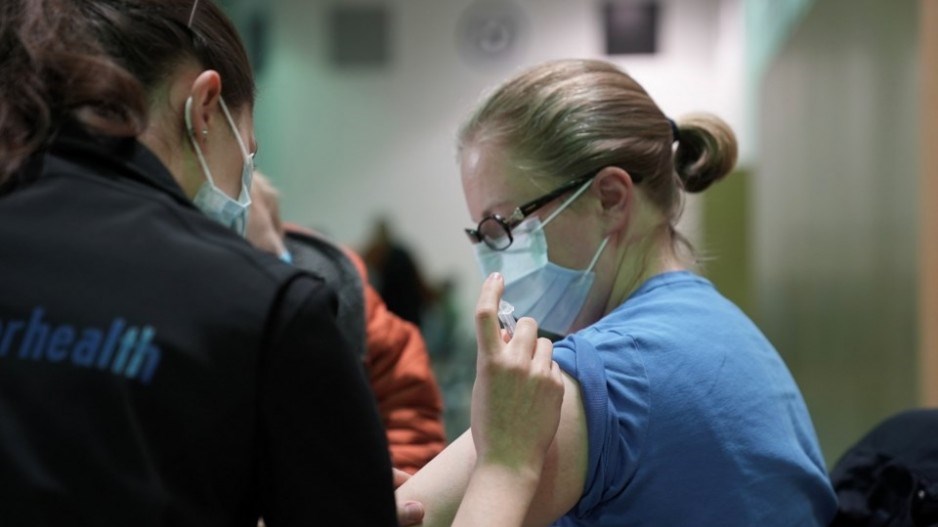B.C. is cutting the interval between first and second COVID-19 vaccine doses by three weeks as the province deals with an ongoing outbreak in the Central Okanagan local health region.
Provincial health officer Dr. Bonnie Henry announced Monday that the interval between doses was being reduced from 49 days to 28 days to ensure more people are fully vaccinated. About 170,000 invitations will be sent to British Columbians in the coming days.
But Henry acknowledged that a longer interval between doses provides stronger and longer lasting protection against COVID-19.
She said that if British Columbians do not live in a region in which cases are rising or they work in an industry where people are at less risk, they should consider not reducing their interval.
But with people in high-transmission regions being encouraged to reduce their intervals, it remains unclear what that means for ensuring longer-term protection for many.
“Right now, we don’t expect a third dose for most people … at least not in the short-term,” she said, adding that a booster dose might be needed in 2022 or 2023.
“It looks like there might be a case for providing a third dose to people whose immune systems didn’t respond to dose one and two.”
The interval was previously reduced from 56 to 49 days last month in a bid to ensure more British Columbians were fully vaccinated.
Henry also revealed Monday that B.C. residents can access records of their vaccinations online by registering at .
Once registered, it takes about a week for health officials to ensure the information is accessible online.
“This is important because it gives us a better understanding of our immunization rate but it also means that you have access to the official record of your immunizations,” Henry said.
Health Minister Adrian Dix also said during Monday’s briefing that any British Columbian not vaccinated against COVID-19 can now walk into a vaccine clinic without an appointment to get their first dose.
Dr. Sue Pollock, chief medical health officer of Interior Health, said last week the number of cases in her health region have tripled since July 28, growing from 320 to about 1,200 as of August 6.
Effective Monday, new restrictions are in place in the Central Okanagan communities of Peachland, West Kelowna, Kelowna Lake Country, West Bank First Nation lands and the electoral districts of the Central Okanagan.
Bars and nightclubs are closed, and restaurants face limits on indoor and outdoor dining — including stopping liquor service at 10 p.m.
Meanwhile, outdoor personal gatherings and outdoor organized gatherings are limited to 50 people. Personal indoor gatherings are now back to five people or one other household, while organized seated gatherings indoors are restricted to 50 people.
The number of people who can visit inside any given vacation rental is now limited to five people, plus the occupants.
To date, 3,807,940 first doses have been administered in B.C. along with 3,259,798 second doses, with the latter representing 63.3% of the .


